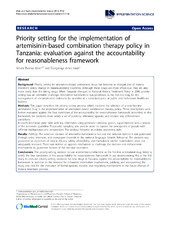| dc.description.abstract | Background: Priority setting for artemisinin-based antimalarial drugs has become an integral part of malaria treatment policy change in malaria-endemic countries. Although these drugs are more efficacious, they are also more costly than the failing drugs. When Tanzania changed its National Malaria Treatment Policy in 2006, priority setting was an inevitable challenge. Artemether-lumefantrine was prioritised as the first-line drug for the management of uncomplicated malaria to be available at a subsidized price at public and faith-based healthcare facilities. Methods: This paper describes the priority-setting process, which involved the selection of a new first-line antimalarial drug in the implementation of artemisinin-based combination therapy policy. These descriptions were further evaluated against the four conditions of the accountability for reasonableness framework. According to this framework, fair decisions must satisfy a set of publicity, relevance, appeals, and revision and enforcement conditions. In-depth interviews were held with key informants using pretested interview guides, supplemented with a review of the treatment guideline. Purposeful sampling was used in order to explore the perceptions of people with different backgrounds and perspectives. The analysis followed an editing organising style. Results: Publicity: The selection decision of artemether-lumefantrine but not the rationale behind it was publicised through radio, television, and newspaper channels in the national language, Swahili. Relevance: The decision was grounded on evidences of clinical efficacy, safety, affordability, and formulation profile. Stakeholders were not adequately involved. There was neither an appeals mechanism to challenge the decision nor enforcement mechanisms to guarantee fairness of the decision outcomes. Conclusions: The priority-setting decision to use artemether-lumefantrine as the first-line antimalarial drug failed to satisfy the four conditions of the accountability for reasonableness framework. In our understanding, this is the first study to evaluate priority-setting decisions for new drugs in Tanzania against the accountability for reasonableness framework. In addition to the demand for enhanced stakeholder involvement, publicity, and transparency, the study also calls for the institution of formal appeals, revision, and regulatory mechanisms in the future change of malaria treatment policies. | en_US |

